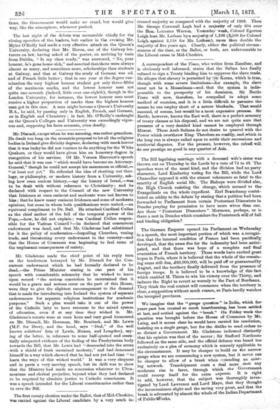Mr. Disraeli, except.when he was amusing, wasrather grandiose.
He dwelt too long on the eccentric proposal to let all the religious bodiesin Ireland give divinity degrees, deelaring•with mock, horror
that it was luckyhe did not venture to do anything for the White Quakers, or they would have given him an honorary degree in recognition of his services. Of Mr, Vernon Harcourt's. speech he said that it was one " which would have become an Attorney- General," though he could not accept his assurances as official,— " at least not yet." He ridiculed the idea of shutting out theo- logy, or philosophy, or modern history from a University, ask- ing how even ancient history,—say the history of Israel,—was to. be dealt with without reference to Christianity ; and he declared with respect to the Council of- the new- University that Irishmen at once eminent and moderate were not known to him ; that he knew many eminent Irishmen and some of moderate opinions, but none in whom both qualifications were united,—an equivocal compliment to Dr. Ball. He attacked Cardinal Cullen as the chief author of the fall of the temporal power of the Pope,—how, he did not explain ; was Cardinal Cullen respon- sible for the Vatican Council ?—he declared that concurrent endowment was dead; and that Mr. Gladstone had substituted for it the policy of confiscation—despoiling Churches, vexing trade, and threatening every endowment in the country—and. that the House of Commons was beginning to feel, some of the unpleasant. consequences of satiety.






































 Previous page
Previous page